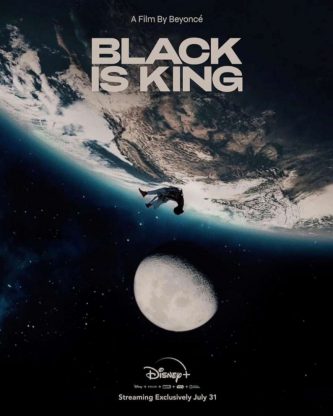
Inspired by the 2019 movie remake of “The Lion King,” Beyoncé Knowles-Carter’s latest visual album, “Black is King,” debuted on Disney+ on July 31.
Based on songs from the 24-time Grammy Award-winner’s soundtrack album, “The Lion King: The Gift,” the visual album showcases the vibrance and beauty of Black culture, Black identity, and common experiences shared by members of the Black diaspora.
“Black is King” can be perceived as a retelling of Disney’s “The Lion King” as the album follows the story of self-discovery made by a young Black man, preparing to take on the role of a patriarch. Featuring captivating fashion, makeup and set designs, made to reflect the richness and uniqueness of African traditions, the visual album reimagines the classic Disney tale “for today’s young kings and queens in search of their own crowns.”
Defined as “a celebratory memoir for the world on the Black experience,” Beyoncé’s visual album was in production for a year before its release and can be streamed exclusively on Disney+. “Black is King” is meant to accompany the soundtrack of Disney’s “The Lion King” remake, in which Beyoncé voiced Nala, the lead female character.
Many themes like family, change and inner strength can be observed in both “The Lion King” and Beyoncé’s latest album. However, the motif of Black excellence is much stronger and prevalent in “Black is King” than in any other Disney work thus far. The theme of Pan-Africanism was also emphasized in the visual album through highlighting the Afrobeat music genre, showing distinct customs within African subcultures and using various African languages in the film’s interludes.
“Black is King” reveals some of the truths, both joyful and painful, faced by those in the Black community to a huge variety of audiences. The topics of beauty standards for Black women and Black wealth and regality in the music videos for “Brown Skin Girl” and “Mood 4 Eva” are respectively addressed and presented with incredible detail. It is clear that the visual album celebrates Black culture with the goal to expose non-Black viewers to some of the multi-faceted sides of “Blackness” not shown in today’s mainstream media.
In one monologue, Beyoncé offers this statement for viewers to ponder: “To live without reflection for so long might make you wonder: Do you truly exist?” This line calls attention to an experience that most Black Americans can recognize — underrepresentation. It would be impossible to summarize and showcase the wide spectrum that is the Black experience in an 85-minute work like “Black is King,” but Beyoncé’s dedication to sharing some of the Black experience with the world should not go unnoticed or unappreciated.











